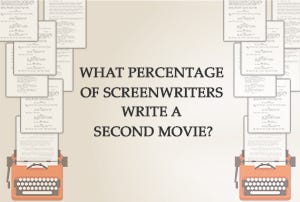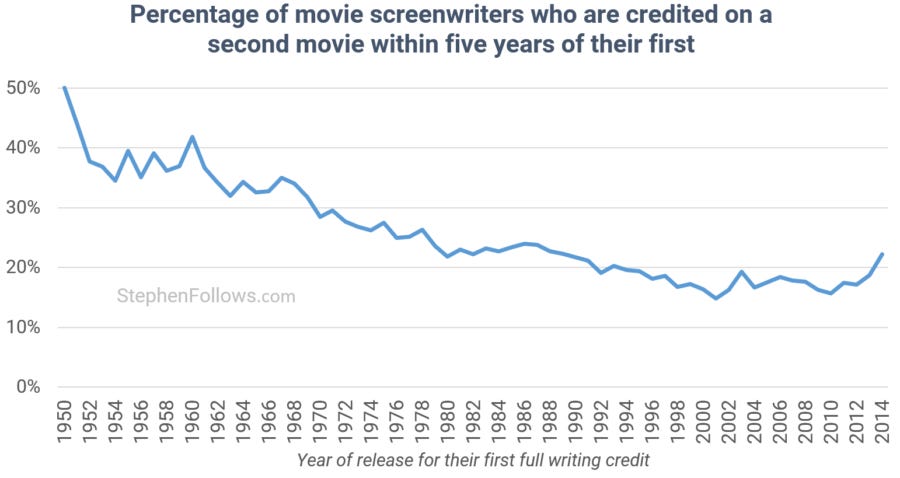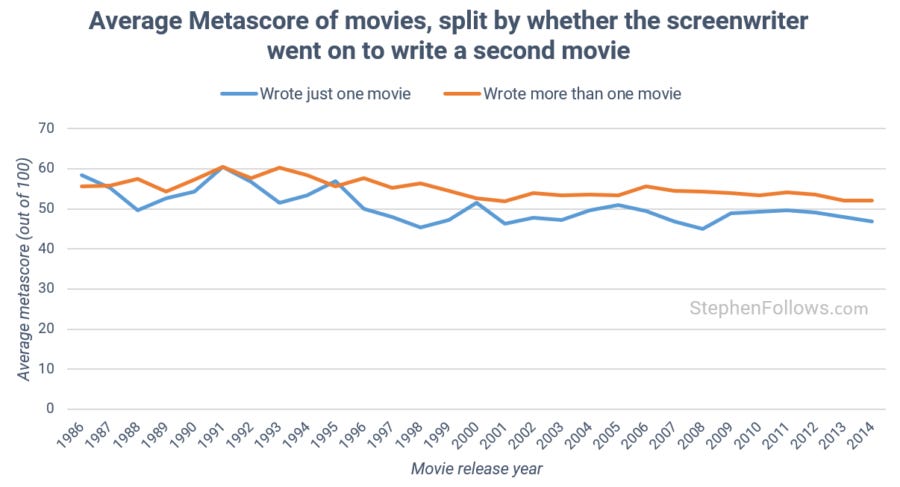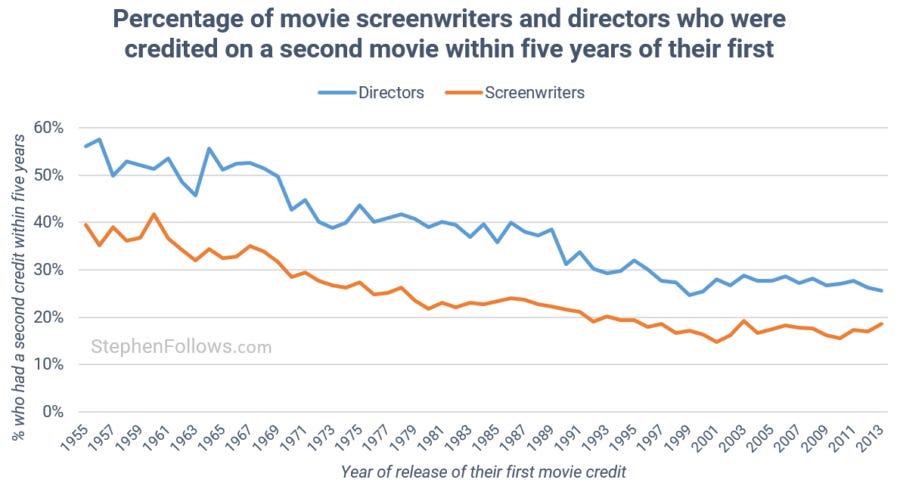What percentage of screenwriters write a second movie?

Last week, I looked at the average number of credited screenwriters on movies. This gave me an insight into how many scripts were written by just one person, and how many were written as part of a team or chain of writers.
The same data on screenwriting credits can reveal other aspects of what it's like to be a professional screenwriter.
Today we're going to look at how many scripts professional screenwriters write during their film career.
What percentage of screenwriters write a second movie?
I'm using a dataset of all live-action fiction feature films made over the past seventy years, covering 280,000 movies and 145,000 people.
It seems that the majority of screenwriting careers could be described as 'one and done'. 66% of writers only wrote one film, 16% had two credits and just one in five writers wrote three or more produced films.

How have things changed over the past seventy years?
The previous chart brings together seventy years' worth of data, over which time the industry has changed quite a bit Let's split the data by year to get a sense of how the landscape for writers has shifted.
The chart below tracks what percentage of writers went on to receive a second full writing credit within five years of their first. It reveals that there has been a steady decline in the likelihood of a writer writing a second film. In the 1950s it was an average of 39% whereas in the 2000s it had fallen to just 17%.

When crunching the numbers I started to wonder - if your sole goal was to have as many movie writing credits as possible, should you seek to work as a solo writer or as part of a team?
Your initial reaction is probably the same as mine, i.e. guessing that working as part of a team enables you to write a greater number of movies because you're sharing the workload. However, the data reveals that there is no difference in the likelihood of making additional movies as a solo or a team writer. (The only slight difference is if you're interested in writing more than ten movies, as which point it's marginally better to be a solo writer).
Are oft-hired writers better than their one-time peers?
One reason a writer may not be re-hired is that they have been judged to have done a poor job. We can't hope to track this (neither whether they did a poor job, nor whether the perception is that they did a poor job - not the same thing in Hollywood!) But we can look for clues.
By the time a movie reaches audiences, it is the product of a whole chain of people. Starting with the writer, then the director, producer, actors, editor, studio, etc. All of these people could be making the movie better or worse. That said, I would argue that the vast majority of great films started with a great script, and, to a lesser degree, many bad films are due to poor scripts.
The Metascore is the average rating given to a movie by a selection of top critics, expressed as a number out of 100. As the chart below shows, movies from writers who did not go on to write a second film are, on average, slightly worse than movies from writers who went on to write again.

The overlap between writing and directing
A year ago, I looked at how many directors directed a second film within five years of their first, and so we're able to overlay this data on top of the trend for screenwriters that we've seen above.
Interestingly, the pattern for repeat screenwriting is very similar to that of repeat directors.

This data is not enough on its own to say for certain why the correlation exists. Among the contributing factors could be:
The prevalence of writer-directors. Five years ago, I found that around a third of directors of top-grossing films were also credited as a writer on the project. The research revealed a slight growth trend over the past two decades, which would certainly add to the likelihood that the repeat directors/writers graphs would align. That said, the research was only for the top 100 grossing films of each year and even if the trend held out for all movies, it couldn't solely explain the overall trend.
Both are the result of the same wider industry shift. It could be that over the past few decades, the industry has become more open, resulting in a more competitive landscape for both roles.
Final thoughts
By this point, you may be a little shocked at this high attrition rate. Many emerging writers will regard having their first screenwriting credit on a produced movie as a landmark moment, signalling that they have "made it" in their chosen profession. To discover that the odds are against them getting any further in film might be dispiriting.
In the hopes of providing some solace, here are a few happy thoughts to end on:
Writers are employed in other fields. Some of the one-off film writers will go on to gainful employment on TV shows, games, radio, books, magazines and more.
Some people will discover they don't want to write movies. They go through the process once and then discover it doesn't suit them. Therefore, the lack of a second credit for these people is not a failure but an expression of revised goals.
Some will be people whose primary career path is acting, directing or producing. Their first movie propelled them into their chosen field and after that they never again needed to write their own movies.
An open, inclusive industry is likely to have a higher turnover than a closed shop. As barriers to entry in the film industry are falling, writing is open to a much larger constituency of people than in the past.
Notes
Today's research looks at live-action fiction feature films (i.e. not animations or documentaries). It covers all films made, not just those released in cinemas. The raw data came from IMDb, The Numbers / OpusData and Wikipedia.
In this research "a writing credit" is defined as being listed as a main writer on the films. This excludes supplementary writing credits such as being the author of the source material, the creator of characters or receiving credits such as "story by". I don't wish to diminish the value of these credits, nor the work that can sit behind them, it's just that this project is focused on what most people think of when they refer to a film's writer(s).
"First-time writer" in this research refers to someone who has not previously received a full writing credit on a feature film. In many cases, they will have written for other formats, such as TV or short films. Even if it does refer to their first produced piece of content, they are very likely to have written a number of unproduced scripts first. These could have been written as part of the learning process, projects which have not yet been picked up or 'spec' scripts written to impress gatekeepers.
Further reading
If you enjoyed this article, you may also enjoy the following past pieces:
Epilogue
Now that I have built this dataset of writing credits I can use it to answer other questions. if there's anything you'd like to know, drop me a line or leave a comment below.


